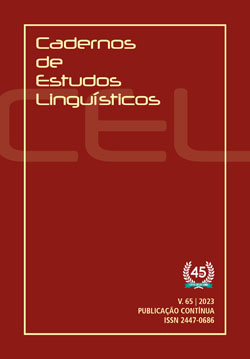Abstract
The present work is aimed at studying a type of Fictivity in direct speech and the distinct ways it operates both discursively and intersubjectively by drawing on real speech data of Brazilian Portuguese spoken in the state of Minas Gerais. The study relies on Cognitive Linguistics, outlining the concept of construal as guiding the hypothesis that in their face-to-face interactions speaker and addressee use the Conversation Frame in order to structure Fictive Interaction (PASCUAL, 2014), especially the type here under study – Fictive Direct Speech (ROCHA, 2022) – as an intersubjective and argumentative device. The notion of (inter)subjectivity (VERHAGEN, 2005; TRAUGOTT; DASHER, 2005) intertwined with the notion of construal (VERHAGEN, 2005; TALMY, 2000; LANGACKER, 2008) is viewed as either linguistically codifying the attention of the speaker towards his/her addressee or as cognitively signalling alignment of perspectives (ALMEIDA, 2019). In regard to methodology, a corpus was compiled from spontaneous speech recordings at a beauty salon for the present analysis. We have adopted a methodology which blends a corpus-based and a corpus-driven approach to data (MCENERY; HARDIE, 2012; TOGNINI-BONELLI, 2001) thus allowing the corpora to guide our analysis. Apart from that, the qualitative approach to data not only conveyed Fictive Interaction samples of Fictive Direct Speech but also made it possible to identify distinct semantic-syntactic patterns exhibiting specific prosodic features. The results make the empirical acceptability of the phenomenon clear and reveal the use of Fictive Direct Speech as an attentional frame, and perspective-taking as an intersubjective and argumentative device for ultimately aligning different vantage points through discourse.
References
ALMEIDA, S. A. F. O conceito de perspectiva na rede conceptual das construções completivas epistêmicas: o caso das construções intersubjetivas disjuntivas. Revista Entrepalavras, v. 9, p. 214-236, 2019.
ALMEIDA, Sandra; FERRARI, L. V. Subjectivity, intersubjectivity and epistemic complementation constructions. Online Proceedings of UK CLA meetings, v. 01, p. 110-127, 2012.
BROWN, G.; YULE, G. Discourse analysis. Cambridge: Cambridge University Press, 1983.
GOLDBERG, A. Constructions: a construction grammar approach to argument structure. Chicago: The University of Chicago Press, 1995.
GOLDBERG, A. Constructions at work: the nature of generalization in language. New York: Oxford University Press, 2006.
LANGACKER, R. W. Foundations of Cognitive Grammar: Theoretical Prerequisites. Vol. 1. Stanford: Stanford University Press, 1987.
LANGACKER, R. W. Concept, Image, and Symbol: The Cognitive Basis of Grammar. Berlin and New York: Mouton de Gruyter, 1991.
LANGACKER, R. W. Cognitive Grammar: a basic introduction. New York: Oxford University Press, 2008.
LODER, L. L.; JUNG, N. (orgs.). Fala-em-interação social: uma introdução à Análise da Conversa Etnometodológica. Campinas: Mercado de Letras, 2008.
MCENERY, T.; HARDIE, A. Linguistics: method, theory and practice. Cambridge: Cambridge University Press, 2012.
PASCUAL, E. Imaginary trialogues: conceptual blending and fictive interaction in criminal courts. 2002. 295 f. Tese (Doutorado em Linguística) – Vrije Universiteit, Amsterdam, 2002.
PASCUAL, E. Fictive interaction: the conversation frame in thought, language and discourse. Amsterdam: John Benjamins, 2014.
PASCUAL, E.; SANDLER, S. The conversation frame: forms and functions of fictive interaction. Amsterdam: John Benjamins, 2016.
ROCHA, L. F. M. A construção da mímesis no reality show: uma abordagem sociocognitivista para o discurso reportado. 2004. Tese (Doutorado em Linguística). Universidade Federal do Rio de Janeiro, Rio de Janeiro.
ROCHA, L. F. M. A perspectivação conceptual em Autocitação Factiva e Fictiva. DELTA. Documentação de Estudos em Linguística Teórica e Aplicada (PUCSP. Impresso), v.29, p. 311-339, 2013.
ROCHA, L. F. M. Autocitação fictiva em português europeu e brasileiro. Alfa: Revista de Linguística (UNESP. Online), v.58, p.63-92, 2014.
ROCHA, L. F. M. Cá, com os meus botões: conversar comigo mesmo por que, para que e para quem. 2022. Tese (Promoção a Professor Titular). Universidade Federal de Juiz de Fora, Juiz de Fora, Minas Gerais.
ROCHA, L.; ARANTES, P. Intonation of fictive vs. actual direct speech in a Brazilian Portuguese corpus. In: PASCUAL, E.; SANDLER, S. (Eds.) The conversation frame: forms and functions of fictive interaction. Amsterdam: John Benjamins, 2016.
SILVA, A. S. da. Significado, conceptualização e experiência: sobre a natureza do significado linguístico. Revista Portuguesa de Humanidades: Braga, v. 10 1/2, 2006, p. 13-40.
SILVA, A. S. da. Perspectivação conceptual e Gramática. Revista Portuguesa de Humanidades: estudos linguísticos. Faculdade de Filosofia da UCP, Braga,vol. 12-1, p. 17-44, 2008.
TALMY, L. Toward a cognitive semantics. 2 volumes. Cambridge, MA: Massachusetts Institute of Technology, 2000.
TOGNINI-BONELLI, E. Corpus linguistics at work. Amsterdam/Atlanta: John Benjamins, 2001.
TRAUGOTT, E. C; DASHER, R. B. Regularity in Semantic Change. Cambridge: Cambridge University Press, 2005.
VERHAGEN, A. Constructions of Intersubjectivity: Discourse, Syntax and Cognition. New York: Oxford University Press, 2005.
VERHAGEN, A. Construal and perspectivization. In: GEERAERTS, D.; CUYCKENS, H. (eds.). The Oxford handbook of Cognitive Linguistics. New York: Oxford University Press, 2007.
VERHAGEN, A. Intersubjectivity and the architecture of the language system. In: ZATLEV, J. et al (eds.). The shared mind: perspectives on intersubjetivity. Vol.12, Amsterdam/Philadelphia: John Benjamins, 2008.

This work is licensed under a Creative Commons Attribution-NonCommercial 4.0 International License.
Copyright (c) 2023 Cadernos de Estudos Linguísticos


